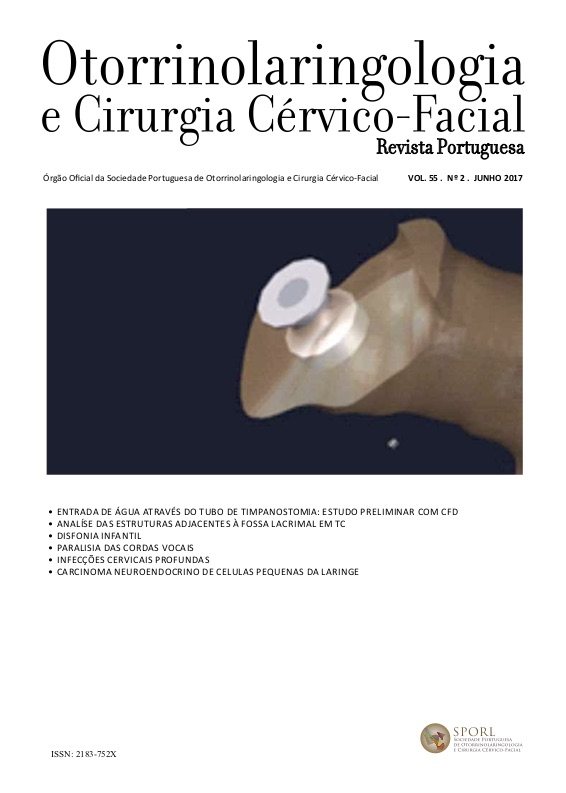Vocal fold paralysis: 10 years experience
DOI:
https://doi.org/10.34631/sporl.390Keywords:
unilateral vocal cord paralysis, bilateral vocal cord paralysis, laryngeal immobility, dysphonia, dyspnea, dysphagia, laryngoplasty medialization, thyroplasty, laryngeal injection, lateralizationAbstract
Introduction: vocal cord paralysis is a fundamental entity and challenging in its diagnosis and therapy. This study aims to evaluate the 10 years experience of the ENT Department of CHVNG/E.
Material and methods: patients with the diagnosis “Vocal Cord Paralysis” that were submitted to surgery and that were evaluated by nasofibrolaryngoscopy were screened from 1 July 2004 to 30 June 2014. We evaluated the etiology, diagnosis and management, and outcome.
Results: The most frequent etiology is iatrogenic (66.4%), mostly thyroid surgery (90.7%). Dysphonia is the most common symptom (82.3%), and dysphagia and dyspnea may occur. The diagnostic starts with a careful medical history and directed tests. 74.3% of patients were initially oriented to speech therapy, with good results in cases of unilateral paralysis (8.5% full recovery, 49.1% improved glottal function). In refractory cases, patients underwent surgical intervention: in unilateral paralysis, laryngeal injection medialization (34,8%); in bilateral paralysis, temporary or permanent lateralization procedure according to the evolution over time (65.9%), and tracheostomy (19.1%). 13.3% of patients required at least one reoperation for symptomatic control.
Conclusion: The vocal cord paralysis is not a disease in itself but a manifestation of a basic condition, so the variable etiology requires an accurate diagnostic study. The therapeutic approach addresses the symptomatic relief, either through conservative or surgical techniques, allowing to restore partially or totally the speech, respiratory and digestive function.
Downloads
References
Jackson C., Ventriculocordectomy: a new operation for the cure of goitrous paralytic laryngeal stenosis. Arch Surg, 1922, 4(2):257-274
Thornell WC, Intralaryngeal approach for arytenoidectomy in
bilateral abductor paralysis of the vocal cords: a preliminar report, Arch Otolaryngol, 1948, 47(4):505-508
Ossof RH, et al., Endoscopic laser arytenoidectomy for the treatment of bilateral vocal cord paralysis. Laryngoscope, 1984, 94(10):1923-1927
Dennis DP, Kashima H, Carbon dioxide laser posterior cordectomy for treatment of bilateral vocal cord paralysis, Ann Otol Rhinol Laryngol, 1989, 98:930-934
Crumley RL, Endoscopic laser medial arytenoidectomy for airway management in bilateral laryngeal paralysis. Ann Otol Rhinol Laryngol, 1993, 102(2):81-84
Lichtenberger G, Endo-extralaryngeal needle carrier instrument.
Laryngoscope, 1983, Oct; 93(10):1348-50
Yung K, Likhterov I, Courey M, Effect of temporary vocal fold injection medialization on the rate of permanente medialization laryngoplasty in unilateral vocal fold paralysis patients. Laryngoscope, 2011, 121:2191-94
Bruening W. Uber eine neue Behandlungsmethode der Rekurrenslahmung. Verh Dtsch Laryngol 1911, 18:23
Isshiki N, Morita H, Okamura H, Hiramoto M, Thyroplasty as a new phonosurgical technique. Acta Oto-laryngologica, 1974, 78, 1-6:451-457
Mattioli F, Bergamini G et al., The role of early voice therapy in the incidence of motility recovery in unilateral vocal fold paralysis. Logoped Phoniatr Vocol, 2011, 36:40-47
Terris D, Arnstein D, Nguyen H, Contemporary evaluation of unilateral vocal cord paralysis (review). Otolaryn Head and Neck Sur, 1992; 107:84-90
Sapundzhiev N, Lichtenberger G, Eckel HE, Friedrich G, Surgery of adult bilateral vocal fold paralysis in adduction: history and trends. Eur Arch Otorhinolaryn, 2008, 265(12):1501-14
Friedman AD, Burns JA, Heaton JT, Zeitels SM, Early versus late injection medialization for unilateral vocal fold paralysis. Laryncoscope, 2010, 120:2042-46
Gorphe, P et al., Endoscopic laser medial arytenoidectomy for treatment of bilateral vocal fold paralysis. 2013, Arch Otorhino, 270:1701-05
Phua CQ, Mahalin-Gappa Y, Homer J, Karagama Y, Injection laryngoplasty. The Otorhinolaryngologist, 2013, 6(2): 111-18
Hyodo M, Nishikudo K, Motoyoshi K, Laterofixation of the vocal fold using na endo-extralaryngeal needle carrier for bilateral vocal fold paralysis. Auris Nasus Larynx, 2009, 36(2):181-6
Testa D, Guerra G, Landolfo PG, Nunziata M et al., Current Therapeutic prospectives in the functional rehabilitation of vocal fold paralysis after thyrodectomy: CO2 laser aritenoidectomy. Int Journ of
Sur, 2014, S48-51
Dietrich M, Abbott KV, Gartner-Schimdt J, Rosen CA, The frequency of perceived stress, anxiety and depression in patients with common pathologies affecting voice. Journal of Voice, 2008, 22(4) 472-88






